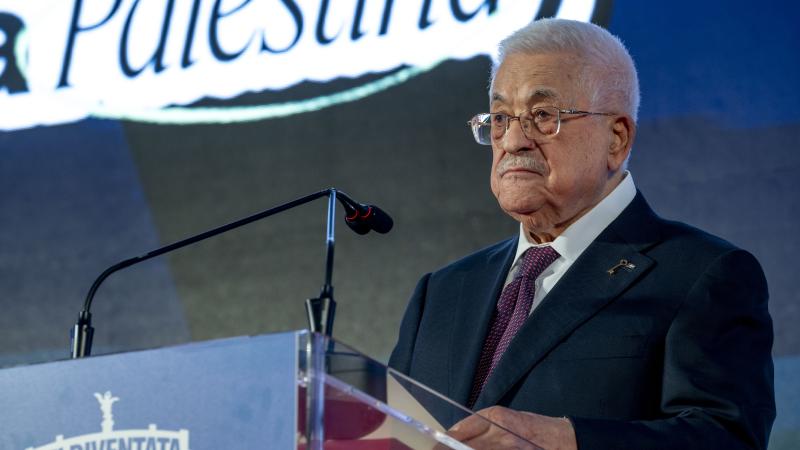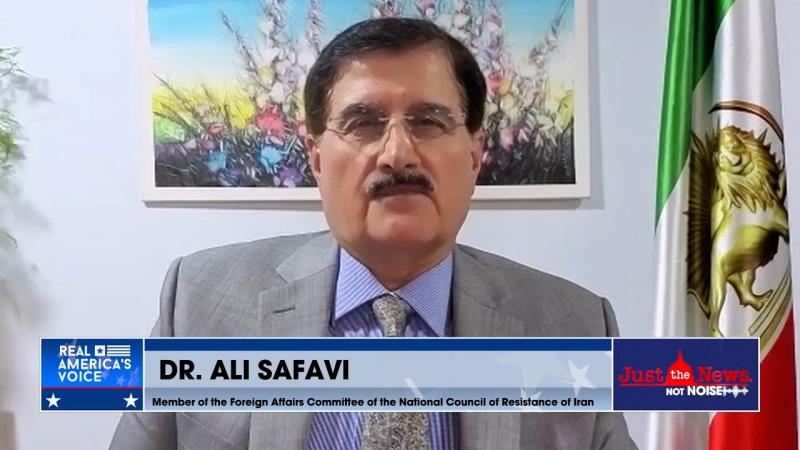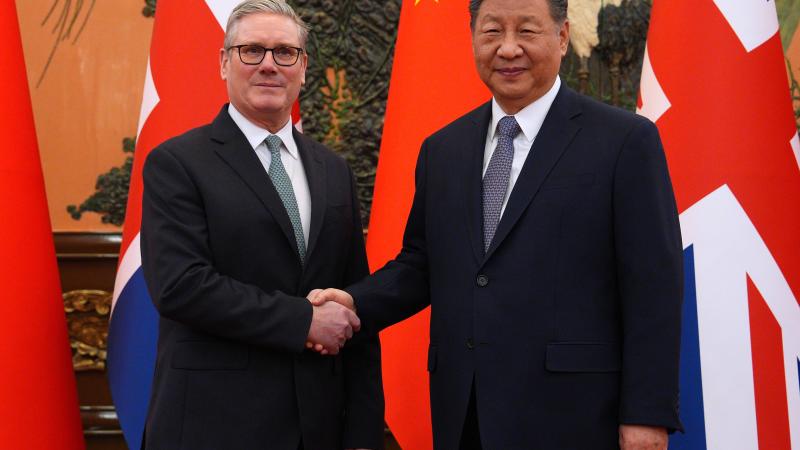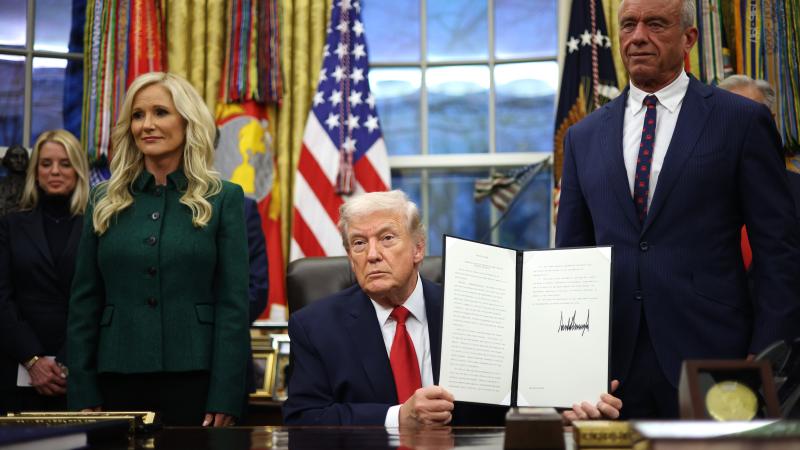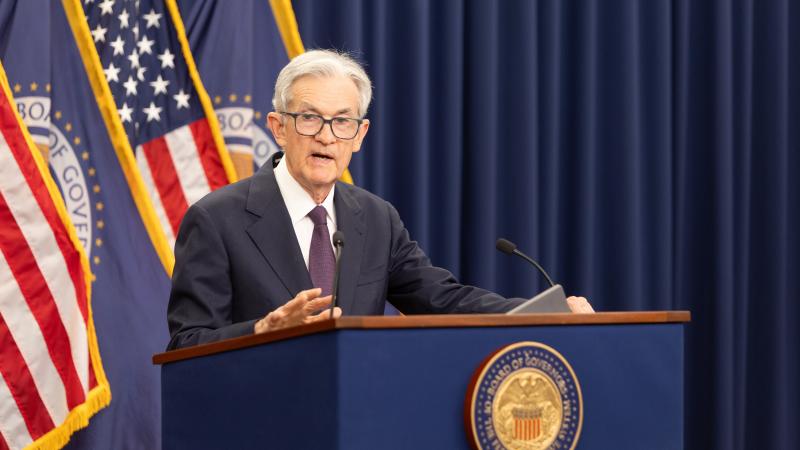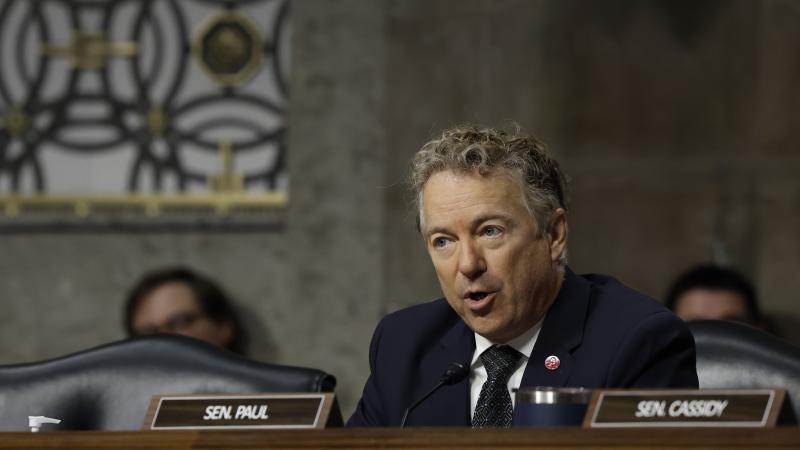Iran tried to stop Trump’s election, but it failed — then Israel struck at the Iranian nuke program
A meddling Iran sought to stop Trump from winning re-election after his "maximum pressure" campaign against the regime. In 2024, Iranian operatives tried to use hack-and-leak operations and even assassination plots to keep Trump out of power. It didn't work, and now it appears Israel is targeting the Iranian nuclear weapons program with Trump's tacit agreement.
The Iranian theocratic regime sought to undermine President Donald Trump’s reelection bid in 2020. After Joe Biden's victory, they then doubled down in 2024 through a host of election-meddling efforts and even assassination attempts in 2024 — with Trump winning that election, and Israel soon striking at the heart of Iran’s nuclear weapons program.
Last week, Israeli Prime Minister Benjamin Netanyahu announced the start of Operation Rising Lion, as Israeli jets and drones did significant damage to Iranian nuclear facilities, ballistic missile sites, drone production factories, and military compounds as the Israelis also targeted Iranian military and intelligence officials and nuclear scientists — all with the seeming acquiescence, although not the direct participation, of Trump and the U.S. military.
“Two months ago I gave Iran a 60 day ultimatum to ‘make a deal.’ They should have done it!” Trump said on his Truth Social site on Friday shortly after Israel’s campaign began. “Today is day 61. I told them what to do, but they just couldn’t get there. Now they have, perhaps, a second chance!”
The Iranian efforts to stop Trump in 2020 and 2024 are perhaps unsurprising, given Trump’s consistent mantra that Iran must not be allowed to obtain a nuclear weapon.
Trump said Monday night that "AMERICA FIRST means many GREAT things, including the fact that, IRAN CAN NOT HAVE A NUCLEAR WEAPON. MAKE AMERICA GREAT AGAIN!!!"
Maximum pressure
Trump campaigned in 2016 against the controversial Iranian nuclear deal which had been agreed to by President Barack Obama in 2015.
When Trump won, his first term was marked by a “maximum pressure” campaign against the Iranian regime, with Trump exiting the Iran deal, increasing sanctions against Iran after they had been lifted by Obama, designating the Islamic Revolutionary Guard Corps (IRGC) as a foreign terrorist organization, targeting Iran’s terrorist proxies, killing IRGC leader General Qassem Soleimani, and more.
The Iranian regime responded with a sophisticated election influence effort in the 2020 campaign between Trump and President Joe Biden, with the Iranians fighting to keep Trump away from a second term.
Four years on Easy Street for Hamas & Hezbollah
The Biden administration then spent four years loosening some of the pressure on Iran and seeking a doomed rapprochement with the regime as Biden tried and failed to secure the revival of a deal with Iran. Hamas, considered a proxy of Iran, launched its deadly cross-border terrorist attack and killed hundreds of civilians on October 7, 2023. Israel responded with a significant military campaign in Gaza as well as the targeting of Iran’s Hezbollah proxies in Lebanon. Iran fired hundreds of ballistic missiles at Israel in 2024, and Israel’s aerial campaign in response resulted in the evisceration of much of Iran’s air defenses.
The Biden administration, nonetheless, urged Israel not to target the Iranian regime’s nuclear facilities — something the Israelis largely acquiesced to, until earlier in June after Trump had taken office and his 60-day negotiation deadline with the Iranians had expired.
The Iranians redoubled their efforts during the 2024 election, trying to keep Trump out of office with IRGC-backed assassination plots and with hack-and-leak operations targeting Trump’s campaign and other cyber efforts aimed at stopping him from beating Biden and, subsequently, Vice President Kamala Harris. It didn’t work. Trump won, Iran failed to reach an agreement with the Trump administration, and Netanyahu launched a devastating aerial campaign against the Iranians, with Iran responding with barrages of ballistic missiles aimed at major Israeli cities such as Tel Aviv.
Trump continues to urge Iran to reach an agreement with the U.S. — but remains insistent that the regime must give up its nuclear weapons program.
Revolutionary Iran as a foe of the U.S.
The revolutionary Iranian regime has positioned itself as an adversary of the U.S. ever since it came into power decades ago.
Radical Iranian students and operatives backed by the regime took dozens of American embassy staffers hostage in 1979 and held them for 444 days. Iranian-backed terrorists were behind the 1983 bombing of the U.S. Marine barracks in Beirut, Lebanon which killed 241 U.S. service members. The theocracy was also behind the 1996 Khobar Towers bombing in Saudi Arabia which killed 19 U.S. Air Force personnel.
Iran and its IRGC played a key role in fueling the deadly insurgency in Iraq after the U.S. invaded in 2003, with a spokesman for the Defense Department telling the Washington Examiner in 2019 that Iran was responsible for “at least 603” U.S. service member deaths and that “the casualties were the result of explosively formed penetrators, other improvised explosive devices, improvised rocket-assisted munitions, rockets, mortars, rocket-propelled grenades, small-arms, sniper, and other attacks in Iraq.”
The State Department also assessed in 2020 that, after the 9/11 terrorist attacks, "Iran has allowed Al Qaeda facilitators to operate a core facilitation pipeline through Iran since at least 2009, enabling AQ to move funds and fighters” and that “senior AQ leaders continued to reside in Iran and facilitate terrorist operations from there."
Trump and 'Maximum Pressure' 1.0
The U.S. entered the controversial nuclear deal with the Iranian regime under the Obama administration in 2015. The Iran deal was reached between the “P5+1” (China, France, Germany, Russia, the United Kingdom, and the U.S.), the European Union, and Iran in June 2015.
Iran received from the Obama administration an influx of billions in taxpayers' cash as a result of the Iran nuclear deal, including a jet carrying $400 million in euros and Swiss francs, another $1.3 billion in cash, the release of up to $150 billion in frozen Iranian assets, and the lifting of international sanctions.
The Trump administration, however, reversed course and pursued a “maximum pressure” campaign against Iran, including new sanctions.
Trump pulled the U.S. out of the Iran deal in May 2018, saying, “In theory, the so-called ‘Iran deal’ was supposed to protect the United States and our allies from the lunacy of an Iranian nuclear bomb … In fact, the deal allowed Iran to continue enriching uranium and, over time, reach the brink of a nuclear breakout.” Trump called it “defective at its core.”
The Trump administration also labeled the IRGC as a “specially designated global terrorist” group in 2017 and designated them as a “foreign terrorist organization” in 2019. Trump said at the time that the IRGC “actively participates in, finances, and promotes terrorism as a tool of statecraft” and that it “is the Iranian government’s primary means of directing and implementing its global terrorist campaign.”
Surgical air strikes kill leadership
The IRGC is a powerful branch of Iranian armed forces and, along with its Quds Force, supports terrorists elsewhere in the world, guides Iran’s global proxies, carries out cyberattacks and assassinations, funds missile development, and wields huge influence both inside the country and around the region.
Soleimani was the head of the IRGC and its specialized Quds Force, and the U.S. military took him out through an air strike in early January 2020.
Trump chose to target Soleimani after the violent storming of the grounds of the U.S. Embassy in Baghdad in late December 2019, which in turn followed the Iraqi government’s condemnation of U.S. airstrikes targeting Kataib Hezbollah, an Iranian-backed militia. The U.S. blamed Kataib Hezbollah for attacks on U.S. bases in Iraq, including one resulting in the death of a U.S. contractor.
Then-Attorney General William Barr said in mid-January 2020 that “the president had the authority to act as he did on a number of different bases” and that “his was a legitimate act of self-defense which interrupted an ongoing campaign” against the United States being carried out by Soleimani and his proxies, and that the strike “re-established deterrence” against Iran.
Iran had increased its influence and footing in Iraq following the Obama administration’s military withdrawal from the country and the subsequent invasion by the Islamic State, with Iran backing Shiite militias influenced and often directed by Soleimani to fill the power void.
Iran carried out retaliatory strikes against U.S. military positions in Iraq in the days after Soleimani’s death, including a massive ballistic missile barrage aimed at Iraq’s Al-Asad air base. Dozens of U.S. service members sustained injuries, including concussions and traumatic brain injuries.
The Iranians also shot down a Ukranian civilian airliner taking off from an airport in Tehran, killing the nearly two hundred passengers on board.
Iran sought to stop Trump in 2020
Iranian intelligence sought to undermine Trump’s reelection bid in 2020 through a variety of election influence efforts.
Then-Director of National Intelligence and then-FBI Director Christopher Wray held an October 2020 press conference where they warned that Iran had gained access to U.S. voter registration information, with Ratcliffe warning Iran was trying to harm Trump’s candidacy. Ratcliffe explained: “We have already seen Iran sending spoofed emails designed to intimidate voters, incite social unrest, and damage President Trump.”
A senior U.S. intelligence officer also told The Washington Examiner in October 2020 that “the Iranians follow U.S. politics closely and saw the last debate where the Proud Boys were an issue and saw an opportunity here to manufacture blow back on Trump by creating a narrative that violent Trump supporters are sending out threatening emails.”
A senior U.S. government official also told Reuters at the time, “Either they made a dumb mistake or wanted to get caught. We are not concerned about this activity being some kind of false flag due to other supporting evidence. This was Iran.”
The State Department and Treasury Department sanctioned IRGC-linked groups and other Iranian regime elements in late October 2020 over Iran’s election influence efforts.
After Trump lost that November, the Biden ODNI’s report in March 2021 concluded: “We assess with high confidence that Iran carried out an influence campaign during the 2020 U.S. election season intended to undercut the reelection prospects of former President Trump.”
The ODNI added: “Tehran’s efforts were aimed at denigrating former President Trump. … Iran’s efforts in 2020 — especially its emails to individual U.S. voters and efforts to spread allegations of voter fraud — were more aggressive than in past election cycles. … In a highly targeted operation, Iranian cyber actors sent threatening, spoofed emails purporting to be from the Proud Boys group to Democratic voters in multiple U.S. states.”
The Justice Department then charged Iranian hackers for their roles in the scheme in November 2021, saying the Iranians had carried out “a cyber-enabled campaign to intimidate and influence American voters, and otherwise undermine voter confidence and sow discord, in connection with the 2020 U.S. presidential election.”
Many Democrats had sought to falsely cast doubt on the idea that Iran was trying to undermine Trump’s presidential campaign in 2020.
Nina Jankowicz, who was selected by the Biden administration to be the executive director of the Department of Homeland Security’s ill-fated Disinformation Governance Board, wrongly tried to undercut the assessment that Iran was attempting to hurt Trump’s reelection chances just before the 2020 vote.
The Democrat-led January 6 Select Congressional Committee’s report concealed key information about Iranian election meddling efforts in 2020 and also misled the public about the intelligence community debate over Chinese influencing activities during the 2020 election. The House committee did not disclose that Iran had sought to undermine Trump’s reelection chances in 2020 and also omitted a minority view which concluded that China had tried to influence the 2020 election against Trump.
Biden Admin and the Iranian reset
The Biden administration’s approach to Iran sought to reverse the Trump administration’s maximum pressure efforts. As the Biden administration sought to rejoin a nuclear deal with Iran, it repeatedly restored sanctions relief to the Iranian regime. Biden would also go on to push against Israel directly targeting the Iranian nuclear program.
“I know where the intelligence says it shouldn’t be headed, which is that we shouldn’t lifting sanctions on Iran under any circumstances because the intelligence doesn’t support changing the current policy at all,” Ratcliffe told Fox News in February 2021. “Within days after Joe Biden became President-elect Biden, he talked about wanting to return to the Iranian nuclear deal… My hope was that once he started to receive intelligence briefings, he would change his mind because there’s no intelligence to support that.”
The Biden administration’s efforts towards Iran were complicated by their choice of Robert Malley to be special envoy for Iran. The FBI reportedly launched an investigation into Malley over whether he had leaked classified information, and his security clearance was suspended in the summer of 2023. It was reported by Semafor and Iran International a few months after that that Malley and some of those close to him — including another Biden official — were linked to an Iranian government influence operation.
That ended with a harsh inspector general’s report from the State Department, critical of how the Biden State Department had mishandled the Malley saga.
Biden national security adviser Jake Sullivan declared in late September 2023 that “the Middle East region is quieter today than it has been in two decades.” Hamas, backed by Iran, launched its October 7 terrorist attacks just over a week later.
It was reported by the Wall Street Journal in early October 2024 that “Israel has so far refused to divulge to the Biden administration details of its plans to retaliate against Tehran… even as the White House is urging its closest Middle East ally not to hit Iran’s oil facilities or nuclear sites amid fears of a widening regional war.”
“In response to months of continuous attacks from the regime in Iran against the State of Israel — right now the Israel Defense Forces is conducting precise strikes on military targets in Iran,” the IDF said in late October 2024.
“The regime in Iran and its proxies in the region have been relentlessly attacking Israel since October 7th — on seven fronts — including direct attacks from Iranian soil. Like every other sovereign country in the world, the State of Israel has the right and the duty to respond. Our defensive and offensive capabilities are fully mobilized. We will do whatever necessary to defend the State of Israel and the people of Israel.”
Leaks from Team Biden undermine Israeli efforts
The Wall Street Journal then reported in late October 2024 that Biden and Netanyahu had “agreed on the parameters of the attack in a half-hour phone call” and that “after mounting worry that Israel might strike Iran’s oil infrastructure or even nuclear installations, the Israeli leader set his sights on military targets—to the relief of American officials.”
The U.S. would not place such limitations on Israel after Trump won again in November.
Under the Biden administration, leaks would also undermine the Israelis. Axios reported in October 2024 that “U.S. officials are extremely concerned about a potentially major security breach after two alleged U.S. intel documents about Israel's preparations for an attack on Iran were published by a Telegram account affiliated with Iran.”
CIA analyst Asif William Rahman would be arrested in late 2024 and then sentenced this month for the illegal breaches of national security.
“A former CIA analyst was sentenced today to 37 months in prison for unlawfully retaining and transmitting Top Secret National Defense Information to people who were not entitled to receive it, information which was publicly posted on social media platforms in October 2024,” the Justice Department said in June.
Round Two: Iran seeks to stop Trump in 2024
The Iranian regime reignited its election influence efforts in 2024, hoping that Trump would yet again be defeated in the rematch against Biden which morphed into a campaign against Biden’s vice president, Kamala Harris.
The FBI, the Office of the Director of National Intelligence (ODNI), and the Cybersecurity and Infrastructure Security Agency (CISA) released a joint statement in August 2024 saying that they had “observed increasingly aggressive Iranian activity this election cycle, specifically influence operations targeting the American public and cyber operations targeting presidential campaigns. This includes the recently reported activities to compromise former President Trump’s campaign, which the IC attributes to Iran.”
The New York Times saw things the same way in September 2024, saying that “Iran Emerges as a Top Disinfo Threat in U.S. Presidential Race” and that “with a flurry of hacks & fake websites, Iran has intensified its efforts to discredit American democracy and possibly tip the race against Trump.”
ODNI said that month that it “assesses Iran is making a greater effort than in the past to influence this year’s elections” and that Iranian government elements had “denigrated the former President [Trump]” and had engaged in a “hack and leak” operation against his campaign.
The FBI, ODNI, and CISA made it clear that month that Iranian hackers had sent Biden’s campaign emails in June and July which “contained an excerpt taken from stolen, non-public material from former President Trump’s campaign as text in the emails” and that “Iranian malicious cyber actors have continued their efforts since June to send stolen, non-public material associated with former President Trump’s campaign to U.S. media organizations.”
The Justice Department in September 2024 announced charges against Seyyed Ali Aghamiri and Yaser Balaghi — IRGC operatives — with hacking the Trump campaign. More than 20 charges were made, including conspiracy to provide material support to a designated foreign terrorist organization.
“The activity broadened in late June, when the conspirators engaged in a ‘hack-and-leak’ operation, in which they sought to weaponize campaign material stolen from U.S. Presidential Campaign 1 [Trump] by leaking such materials to members of the media and individuals associated with what was then another identified U.S. Presidential campaign (U.S. Presidential Campaign 2 [Biden]), in a deliberate effort to, as reflected in the conspirators’ own words and actions, undermine U.S. Presidential Campaign 1 in advance of the 2024 U.S. presidential election,” the DOJ said.
As of publication time, both Aghamiri and Balaghi are at large, and are on the FBI's notorious "Most Wanted List." The State Department has offered a reward of up to $10 million.
ODNI said again in early November 2024, just before the election, that “we have assessed that Iran has conducted malicious cyber activities to compromise former President Trump’s campaign.”
Iran plans Trump assassination
The Iranian efforts to keep Trump from returning to office weren’t limited to a hack-and-leak operation. According to federal law enforcement officials, the Iranian regime was also trying to assassinate Trump ahead of the November election.
Pakistani national Asif Merchant was charged in July 2024 in a “murder-for-hire as part of a scheme to assassinate” Trump. Wray said in August 2024 that “this dangerous murder-for-hire plot exposed in today’s charges was allegedly orchestrated by a Pakistani national with close ties to Iran and is straight out of the Iranian playbook.” Law enforcement agents placed Merchant under arrest before he could leave the country. Prosecutors revealed in October 2024 that they planned to use evidence obtained through the Foreign Intelligence Surveillance Act against Merchant, who remains detained ahead of a possible trial.
Then-candidate Trump was briefed by American intelligence officials about "real and specific" threats against him from Iran in September of 2024.
The DOJ announced only a few days after Trump won his second election that Farhad Shakeri, an alleged IRGC asset residing in Tehran, had been charged in a murder-for-hire plot against Trump.
The DOJ said that “Shakeri has used a network of criminal associates he met in prison in the United States to supply the IRGC with operatives to conduct surveillance and assassinations of IRGC targets” and that “Shakeri has informed law enforcement that he was tasked on Oct. 7, 2024” — the first anniversary of the Hamas attacks — “with providing a plan to kill” Trump.
“According to SHAKERI, in approximately mid-to-late September 2024, IRGC Official-1 asked SHAKERI to put aside his other efforts on behalf of the IRGC and focus on surveilling, and, ultimately, assassinating, former President of the United States, Donald J. Trump (‘Victim-4’ herein),” the DOJ complaint against the IRGC operative stated.
The DOJ complaint continued that “according to SHAKERI, during his meeting with IRGC Official-1 on or about October 7, 2024, IRGC Official-1 directed SHAKERI to provide a plan within seven days to kill Victim-4. If SHAKERI was unable to put forth a plan within that timeframe, IRGC Official-1 continued, the IRGC would pause its plan to kill Victim-4 until after the U.S. Presidential elections, because IRGC Official-1 assessed that Victim-4 would lose the election and, afterward, it would be easier to assassinate Victim-4.”
It was reported by Politico in early October 2024 that “U.S. officials are coming to a troubling realization about Iran’s repeated threats to kill Donald Trump and some of his former top generals and national security strategists: Tehran isn’t bluffing — and it isn’t giving up anytime soon.”
Ryan Routh and the Iranian motivation
Ryan Wesley Routh, who was charged with attempting to assassinate Trump last September, does not appear to have been directed to do so by the Iranian regime, but his own words show that his murder attempt was at least partly psychological: He was driven by his opposition to Trump’s hardline stance toward Iran.
Secret Service agents spotted Routh with a rifle at Trump’s Florida golf course in what authorities said was an apparent assassination attempt on the former and future president.
A court filing by the DOJ in September stated that Routh had written a letter addressed to “The World” which stated, “This was an assassination attempt on Donald Trump but I failed you. I tried my best and gave it all the gumption I could muster. It is up to you now to finish the job; and I will offer $150,000 to whomever can complete the job.” The handwritten letter also argued that Trump “ended relations with Iran like a child and now the Middle East has unraveled.”
Routh also wrote an apparently self-published book in February 2023 titled Ukraine’s Unwinnable War. In it, Routh took “part of the blame” for electing Trump and said: “Iran, I apologize.” He directed a message to Iran: “You’re free to assassinate Trump… No one here in the U.S. seems to have the balls to put natural selection to work or even unnatural selection.”
Trump and the return of ‘Maximum Pressure’
After he won reelection in November, Trump said in February that Iran would be “obliterated” if it assassinated him while in office.
“If they did that they would be obliterated,” Trump told reporters. “I’ve left instructions if they do it, they get obliterated, there won’t be anything left.”
Trump signed an executive order early that month titled “Imposing Maximum Pressure on the Government of the Islamic Republic of Iran, Denying Iran All Paths to a Nuclear Weapon, and Countering Iran’s Malign Influence.”
“Since its inception in 1979 as a revolutionary theocracy, the Government of the Islamic Republic of Iran has declared its hostility to the United States and its allies and partners. Iran remains the world’s leading state sponsor of terror and has aided Hezbollah, Hamas, the Houthis, the Taliban, al-Qa’ida, and other terrorist networks,” Trump’s directive said.
Trump declared that “Iran’s nuclear program, including its enrichment- and reprocessing-related capabilities and nuclear-capable missiles, poses an existential danger to the United States and the entire civilized world” and that “a radical regime like this can never be allowed to acquire or develop nuclear weapons, or to extort the United States or its allies through the threat of nuclear weapons acquisition, development, or use.”
The Trump White House published a fact sheet saying that “Iran should be denied a nuclear weapon and intercontinental ballistic missiles; Iran’s terrorist network should be neutralized; and Iran’s aggressive development of missiles, as well as other asymmetric and conventional weapons capabilities, should be countered.”
Trump said that “I’m torn about” the executive order and that “it’s very tough on Iran… I’m going to sign it, but hopefully I’m not going to use it very much… I don’t have much choice… Iran cannot have a nuclear weapon.”
Trump and ‘Operation Rising Lion’
The International Atomic Energy Agency assessed last week that “Iran's many failures to uphold its obligations since 2019 to provide the Agency with full & timely cooperation regarding undeclared nuclear material & activities at multiple undeclared locations in Iran… constitutes non-compliance.”
Israel’s aerial campaign against Iran’s nuclear program began shortly thereafter.
Netanyahu said last week that Iran’s nuclear weapons program was “a clear and present danger to Israel’s very survival” and said that “this operation will continue for as many days as it takes to remove this threat.”
“We struck at the heart of Iran's nuclear enrichment program. We struck at the heart of Iran's nuclear weaponization program,” Netanyahu said on Thursday. “We targeted Iran's main enrichment facility in Natanz. We targeted Iran's leading nuclear scientists working on the Iranian bomb. We also struck at the heart of Iran’s ballistic missile program.”
Trump said on Truth Social on Thursday that “I gave Iran chance after chance to make a deal. I told them, in the strongest of words, to ‘just do it,’ but no matter how hard they tried, no matter how close they got, they just couldn’t get it done. I told them it would be much worse than anything they know, anticipated, or were told, that the United States makes the best and most lethal military equipment anywhere in the World, BY FAR, and that Israel has a lot of it, with much more to come - And they know how to use it."
“Certain Iranian hardliners spoke bravely, but they didn’t know what was about to happen. They are all DEAD now, and it will only get worse!” Trump said, adding that “Iran must make a deal, before there is nothing left, and save what was once known as the Iranian Empire. No more death, no more destruction, JUST DO IT, BEFORE IT IS TOO LATE.”
Trump also said on Thursday that “we remain committed to a Diplomatic Resolution to the Iran Nuclear Issue” but that Iran “must completely give up hopes of obtaining a Nuclear Weapon.”
And the president declared on Monday night that "Iran should have signed the 'deal' I told them to sign. What a shame, and waste of human life. Simply stated, IRAN CAN NOT HAVE A NUCLEAR WEAPON. I said it over and over again! Everyone should immediately evacuate Tehran!"
A parallel universe
In a science-fiction world where Harris won in November, her running mate, Gov. Tim Walz (D-Minn.) gave a glimpse of what that world might look like. The ink was barely dry on President Trump's executive order last week, when Walz gave a talk at the leftwing Center for American Progress on Friday where he said that China would be a force for good in ending the war between Iran and Israel, and likely had the "moral authority" to do so.
Walz was asked about Israel’s strikes on Iran, and said that he was “deeply concerned” by them and that “the situation in Gaza is intolerable, and it became a central focus in the campaign, and I would say rightfully so.”
The would-be vice president noted that “I voted for the Iran nuclear deal” as a congressman in 2015 and said the goal of it was to “bring about the capacity to stop Iran’s nuclear capacity, but in a way that was not so punitive that we would hamper some of their economic growth.”
“Who is the voice in the world that can negotiate some type of agreement in this? Who holds the moral authority? Who holds the authority to do that?... Now I ask who that is,” Walz said in relation to the current fighting between Iran and Israel. “Consistently over and over again we’re going to have to face the reality — it might be the Chinese.”
The Facts Inside Our Reporter's Notebook
Links
- assassination attempts
- Israeli jets
- seeming acquiescence
- direct participation
- said
- must not be allowed
- assassination plots
- hack-and-leak operations
- continues to urge
- hostage
- 1983
- bombing
- killed
- bombing
- deadly insurgency
- Iran was responsible
- assessed
- reached
- Iran nuclear deal
- pulled
- labeled
- designated
- condemnation
- targeting
- said
- subsequent invasion
- ballistic missile barrage
- traumatic brain injuries.
- shot down
- killing
- press conference
- told
- told
- State Department
- Treasury Department
- Biden ODNI's report
- charged
- sought to falsely cast doubt
- undercut the assessment
- concealed key information
- it
- repeatedly
- restored
- sanctions
- relief
- told
- reportedly
- Semafor
- Iran International
- report
- declared
- asked
- asked
- reported
- said
- reported
- reported
- said
- joint statement
- admitted
- said
- made it clear
- announced charges
- said again
- charged
- said
- announced
- DOJ complaint
- continued
- reported
- reported
- spotted
- apparent assassination attempt
- court filing
- part of the blame
- told
- executive order
- said
- said
- assessed
- said
- said
- said
- said
- gave a talk

